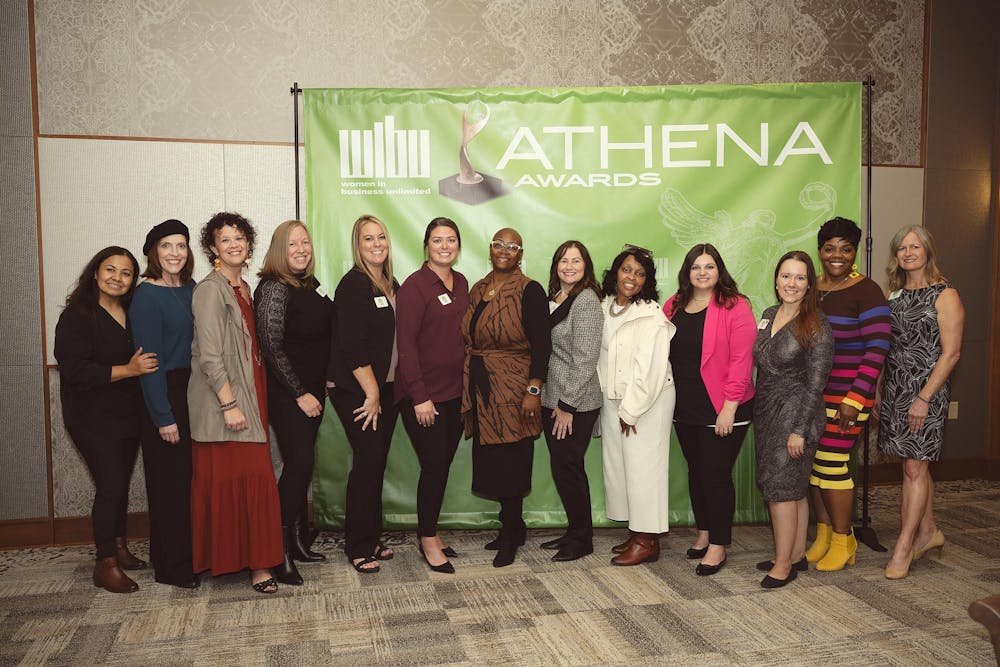Muncie’s Women in Business Unlimited (WIBU) Branch is a networking resource for women across East and Central Indiana, paving the way for a more equitable and empowering workforce.
The not-for-profit organization has one mission: claiming back women's networking power by building something truly just for women. This mission was first established over a decade ago during the organization’s conception, branch president Jessica Shrout said.
Shrout started her journey in the business world in 2018, bordering the precipice of the COVID-19 pandemic, working as a marketing consultant. Although the pandemic was “certainly disruptive,” she was doing “virtual before it was cool,” Shrout said.
During her “major” career change where she opened her own business as a marketing consultant specializing in the waste and recycling industry—which led to her joining WIBU—Shrout said one of the greatest things she did was ask others for help. She encourages other women making similar career shifts to do the same.
“There's very little you need to do on your own,” Shrout emphasized, something she learned early on while attending WIBU meetings.
Now, as the organization’s acting president of the Muncie branch, Shrout lives by the adage, “I know a girl who knows a girl.”
“There’s always some sort of connection — maybe not a first-degree — but a second or third-degree connection. If you speak it, somebody in the room will know how to find it,” she said.
Shrout’s adage supports the idea of the six degrees of separation, a social concept studied by psychologist Stanley Milgram in the late 1960s.
Milgram tested the theory by assigning a few hundred people between Boston and Omaha, NE, to write a letter to a stranger in Boston. Participants were not allowed to use the postal service and were only allowed to utilize people they knew — individuals who they thought might be more closely connected to the “target” recipient — to deliver the letter.
“He found [letters] had changed hands only about six times. This finding has since been enshrined in the notion that everyone can be connected by a chain of acquaintances roughly six links long,” Gardiner Morse wrote for Harvard Business Review.

WIBU Directorial Board Member and Ball State University’s Director of Undergraduate Admissions Lindsey Speer agreed that asking for help while building a network is vital when propelling a business venture. She said the right environment that allows for vulnerability will cultivate comfortability and productivity.
To encourage comfort among participants, WIBU offers flexible membership criteria to those looking to join, including no membership fees and non-mandatory attendance.
“We just decided as an organization that we are not going to put [membership fulfillment] demands on [anyone],” she said. “We're not really seeking to make money on this. All of our board positions are unpaid volunteer roles.”
WIBU’s “low stress, low pressure” motto means participation rates ebb and flow throughout the year, which is anticipated. The organization sees limited attendance in the summer, especially as families go on vacations and children are home from school. However, Shrout said the decrease in participants during the summer months allows for more intimate group connections to be formed.
“We try to provide such a wide variety of different things because we know people are looking for different things [and have] different time commitments or availability or comfort levels,” Speer said.
Speer, who works in event planning on the board of directors, spearheads “Catalyst” and “Athena” — two annual WIBU programs that feed into one another.
The Catalyst program is a one-day event, usually taking place in the fall. It’s designed for women who come from underserved populations and may need “the encouragement, the empowerment, [and] the tools to fulfill what they want to do [with their career].”
The event hosts a series of speakers who share their experiences and answer questions about the business world, ranging from inquiries on proper business attire to creating resumes.
The group-based events allow for a safe space free of judgment.
“Those who attend Catalyst then have the opportunity to attend Athena,” Speer said.
The springtime program event allows participants to see “the bigger picture of [what happens when] women are making impacts, differences and feeling motivated.”
During the Athena program, scholarships are awarded to non-traditional students, typically women who did not follow the traditional high school-to-college trajectory. Participants are also awarded for objectives completed during the program.
For instance, Speer, who now oversees the selection process for those honors, earned the Young Professional Athena Award in 2014, an award given to up-and-coming women who “demonstrate excellence, creativity and initiative in their business or profession,” while also providing valuable insight and helping other women reach their full potential, according to WIBU’s Muncie Branch website.
WIBU also hosts monthly luncheons for those looking to partake, especially those wanting to build women-owned businesses. Attendees pay a fee per luncheon they attend, which allows the organization to welcome public speakers and entrepreneurs to the luncheons, but attendees don’t have to commit to any monthly dues or annual fees.
According to the U.S Small Business Administration, research conducted in 2022 found 42.5 percent of businesses in Indiana were women-owned. This number is slightly higher than the 2018 national average of about 40 percent, according to the Women’s Business Enterprise National Council (WBENC).
“Our work is by no means over, but it’s not the same sort of binary,” Shrout said.
WIBU is not just for women, but people of all perspectives and backgrounds, as its origins are rooted in non-exclusivity.
“We're not waiting for you to get to a certain point in business or a certain career level or job title. If you feel you fit the identifiers of being a woman in business, you're welcome,” Shrout said. “You don't even have to be a full-time employee to show up. These meetings are for anybody who wants to learn and grow and make meaningful connections.”
Contact Katherine Hill with comments at katherine.hill@bsu.edu.





